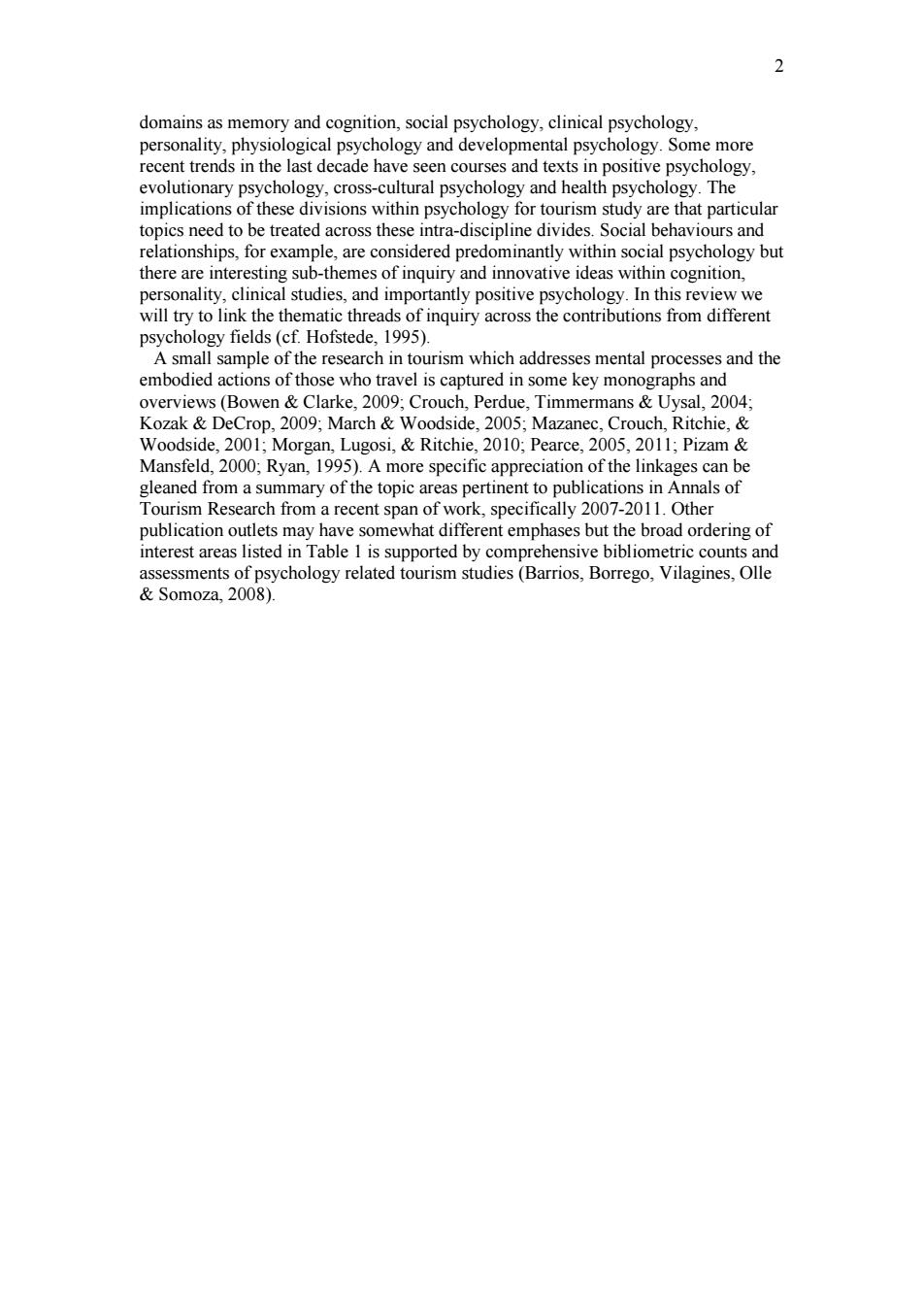正在加载图片...

2 domains as memory and cognition,social psychology,clinical psychology, personality,physiological psychology and developmental psychology.Some more recent trends in the last decade have seen courses and texts in positive psychology, evolutionary psychology,cross-cultural psychology and health psychology.The implications of these divisions within psychology for tourism study are that particular topics need to be treated across these intra-discipline divides.Social behaviours and relationships,for example,are considered predominantly within social psychology but there are interesting sub-themes of inquiry and innovative ideas within cognition, personality,clinical studies,and importantly positive psychology.In this review we will try to link the thematic threads of inquiry across the contributions from different psychology fields(cf.Hofstede,1995). A small sample of the research in tourism which addresses mental processes and the embodied actions of those who travel is captured in some key monographs and overviews(Bowen Clarke,2009;Crouch,Perdue,Timmermans Uysal,2004: Kozak DeCrop,2009;March Woodside,2005;Mazanec,Crouch,Ritchie, Woodside,2001;Morgan,Lugosi,Ritchie,2010;Pearce,2005,2011;Pizam Mansfeld,2000;Ryan,1995).A more specific appreciation of the linkages can be gleaned from a summary of the topic areas pertinent to publications in Annals of Tourism Research from a recent span of work,specifically 2007-2011.Other publication outlets may have somewhat different emphases but the broad ordering of interest areas listed in Table 1 is supported by comprehensive bibliometric counts and assessments of psychology related tourism studies(Barrios,Borrego,Vilagines,Olle Somoza,2008)2 domains as memory and cognition, social psychology, clinical psychology, personality, physiological psychology and developmental psychology. Some more recent trends in the last decade have seen courses and texts in positive psychology, evolutionary psychology, cross-cultural psychology and health psychology. The implications of these divisions within psychology for tourism study are that particular topics need to be treated across these intra-discipline divides. Social behaviours and relationships, for example, are considered predominantly within social psychology but there are interesting sub-themes of inquiry and innovative ideas within cognition, personality, clinical studies, and importantly positive psychology. In this review we will try to link the thematic threads of inquiry across the contributions from different psychology fields (cf. Hofstede, 1995). A small sample of the research in tourism which addresses mental processes and the embodied actions of those who travel is captured in some key monographs and overviews (Bowen & Clarke, 2009; Crouch, Perdue, Timmermans & Uysal, 2004; Kozak & DeCrop, 2009; March & Woodside, 2005; Mazanec, Crouch, Ritchie, & Woodside, 2001; Morgan, Lugosi, & Ritchie, 2010; Pearce, 2005, 2011; Pizam & Mansfeld, 2000; Ryan, 1995). A more specific appreciation of the linkages can be gleaned from a summary of the topic areas pertinent to publications in Annals of Tourism Research from a recent span of work, specifically 2007-2011. Other publication outlets may have somewhat different emphases but the broad ordering of interest areas listed in Table 1 is supported by comprehensive bibliometric counts and assessments of psychology related tourism studies (Barrios, Borrego, Vilagines, Olle & Somoza, 2008)